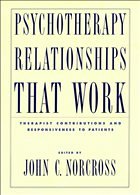Nicht lieferbar

Psychotherapy Relationships That Work
Therapist Contributions and Responsiveness to Patients
Versandkostenfrei!
Nicht lieferbar
Many efforts to improve therapy have focused on codifying evidence-based treatments, but in doing so have left the psychotherapeutic relationship behind. Psychotherapy Relationships That Work is the first book to assemble the numerous advances in understanding the critical relationship between the clinician and the patient into one accessible volume. The volume brings together a distinguished group of psychologists to take stock of which elements of the therapy relationship work, which look promising, and how relationships can be customised to the individual patient. It represents the culminat...
Many efforts to improve therapy have focused on codifying evidence-based treatments, but in doing so have left the psychotherapeutic relationship behind. Psychotherapy Relationships That Work is the first book to assemble the numerous advances in understanding the critical relationship between the clinician and the patient into one accessible volume. The volume brings together a distinguished group of psychologists to take stock of which elements of the therapy relationship work, which look promising, and how relationships can be customised to the individual patient. It represents the culmination of three years of systematic analysis on the part of the APA Division 29 Task Force on Empirically Supported Therapy Relationships to identify, operationalize, and disseminate information on empirically supported therapy relationships. These eminent researchers and clinicians examined the empirical research done to date that illuminates the therapeutic relationship as well as the evidence-based practices that may be used to cultivate and customise that relationship. Each chapter defines the relationship or patient quality - such as empathy, congruence, or attachment style - provides clinical examples, reviews the empirical research and highlights therapeutic practices ensuing from the research results. The volume concludes with recommendations and a discussion of the implications for future training, research and policy. Psychotherapy Relationships That Work will be an indispensable reference for all mental health practitioners, including psychiatrists, psychologists, clinical social workers, counselors and mental health consultants.
Psychotherapy Relationships That Work is the result of the American Psychological Association's Division of Psychotherapy (Division 29) Task Force aimed at applying psychological science to the identification and promulgation of effective psychotherapy. Many efforts to improve therapy have focused on codifying evidence-based treatments, but in doing so have left the psychotherapeutic relationship behind. Clinical experience and research findings underscore that the therapeutic relationship accounts for as much of the outcome as particular treatments. This volume's 25 chapters identify the elements of effective therapy relationships and methods of customizing psychotherapy to the individual patient.
Psychotherapy Relationships That Work is the result of the American Psychological Association's Division of Psychotherapy (Division 29) Task Force aimed at applying psychological science to the identification and promulgation of effective psychotherapy. Many efforts to improve therapy have focused on codifying evidence-based treatments, but in doing so have left the psychotherapeutic relationship behind. Clinical experience and research findings underscore that the therapeutic relationship accounts for as much of the outcome as particular treatments. This volume's 25 chapters identify the elements of effective therapy relationships and methods of customizing psychotherapy to the individual patient.



